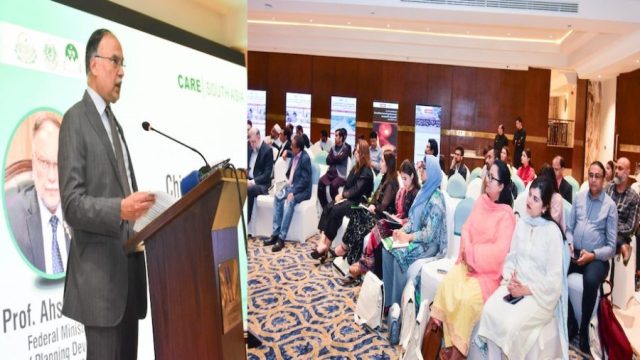ISLAMABAD, Tuesday, July 22, 2025 (WNP): Federal Minister for Planning, Development, and Special Initiatives Professor Ahsan Iqbal issued a stark warning on Tuesday, declaring that climate change is no longer a distant threat but a terrifying present-day reality already wreaking havoc on vulnerable countries like Pakistan.
Speaking at the high-level policy dialogue “From Planning to PRACTICE: Advancing Climate Resilience in Pakistan,” the minister underscored the urgent need for both national action and international accountability to combat the worsening climate crisis.
“Climate change is not a hypothesis. It is a lived reality—impacting our environment, economy, and the very future of our people,” he said, pointing to Pakistan’s exposure to extreme weather events, glacier melt, and rising food insecurity.
Referring to the devastating 2022 floods, which submerged a third of the country, displaced millions, and caused economic damage in the billions, Iqbal called the disaster “a harrowing testament to a planet in crisis.”
“These floods weren’t a fluke. They were a warning. Our planet is changing—and fast,” he added, warning of erratic weather patterns, vanishing glaciers, and growing threats to Pakistan’s food and water security.
Iqbal highlighted that Pakistan, home to over 7,000 glaciers, is witnessing the fastest glacial melt in over six decades, endangering the Indus River system, which supports 90% of the country’s agricultural output. “The melting glaciers are not just environmental losses—they are existential threats,” he warned.
The minister also called out developed nations for failing to deliver on their $100 billion annual climate finance pledge, emphasizing that such support is not charity, but an obligation. “The world has long asked the Global South to ‘Do More.’ Today, we demand: ‘Do More’ from the Global North—for climate justice.”
Reiterating Pakistan’s commitment to climate action, Iqbal said that climate resilience has been embedded in the country’s long-term development strategy, particularly within the national 5Es framework—focusing on Exports, E-Pakistan, Environment, Energy, and Equity.
He urged international stakeholders to match their rhetoric with resources, noting that the window to avert climate catastrophe is rapidly closing. “Environmental justice is no longer optional—it is essential for a just and sustainable future for all.”




